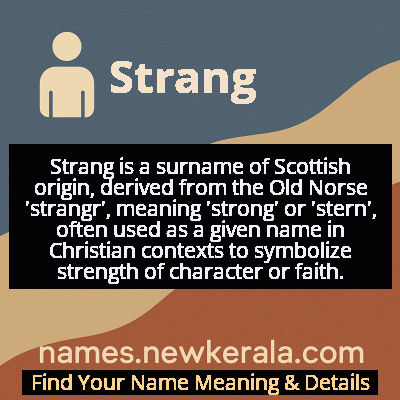Strang Name Meaning & Details
Origin, Popularity, Numerology Analysis & Name Meaning of Strang
Discover the origin, meaning, and cultural significance of the name STRANG. Delve into its historical roots and explore the lasting impact it has had on communities and traditions.
Name
Strang
Gender
Male
Origin
Christian
Lucky Number
7
Meaning of the Name - Strang
Strang is a surname of Scottish origin, derived from the Old Norse 'strangr', meaning 'strong' or 'stern', often used as a given name in Christian contexts to symbolize strength of character or faith.
Strang - Complete Numerology Analysis
Your Numerology Number
Based on Pythagorean Numerology System
Ruling Planet
Neptune (Ketu)
Positive Nature
Intuitive, analytical, spiritual, and inquisitive.
Negative Traits
Secretive, reserved, aloof, and can be overly critical.
Lucky Colours
Green, yellow.
Lucky Days
Monday.
Lucky Stones
Cat’s eye, moonstone.
Harmony Numbers
1, 5, 6.
Best Suited Professions
Scientists, researchers, spiritual leaders, detectives.
What People Like About You
Depth of knowledge, analytical skills, spirituality.
Famous People Named Strang
William Strang
Artist and Engraver
First British etcher elected to Royal Academy, created distinctive portrait etchings
David Strang
Police Officer
Implemented community policing reforms as Chief Constable of Lothian and Borders Police
James Strang
Religious Leader
Founded Strangite Mormon movement and declared himself king of Beaver Island
John Strang
Industrialist
Significant contributor to Glasgow's development during Industrial Revolution
Name Variations & International Equivalents
Click on blue names to explore their detailed meanings. Gray names with will be available soon.
Cultural & Historical Significance
Extended Personality Analysis
Individuals bearing the name Strang typically exhibit a remarkable combination of inner strength and outward calm that makes them natural leaders and reliable partners. Their strength manifests not as aggression but as steady determination—they are the anchors in stormy situations, the problem-solvers in crises, and the voices of reason in conflicts. This core stability often makes them sought-after advisors and friends who provide both practical solutions and emotional support. Their powerful presence is tempered by a strong sense of justice and fairness, leading them to champion causes they believe in and protect those who cannot protect themselves. Strangs often possess excellent strategic thinking abilities, approaching challenges with careful analysis rather than impulsive reactions. While they may take time to warm up to new people, they form deep, lasting bonds with those who earn their trust. Their combination of emotional intelligence and practical competence makes them effective in leadership roles across various fields, from business to community service to creative endeavors where strength of vision is essential.
Modern Usage & Popularity
In contemporary naming practices, Strang remains an uncommon but meaningful choice that appeals to parents seeking names with historical depth and powerful connotations. While primarily used as a surname, its adoption as a first name has grown slightly in recent decades, particularly among families with Scottish heritage or those attracted to virtue names with Christian significance. The name's rarity ensures it stands out while its clear meaning makes it accessible and memorable. Modern bearers of the name often find it opens conversations about heritage and values, serving as a constant reminder of the strength it represents. In professional contexts, the name carries positive associations of reliability and capability that can benefit career advancement. Social media and global connectivity have also contributed to the name's subtle resurgence, as parents increasingly seek distinctive names with clear meanings and cultural roots. The name's straightforward pronunciation and spelling across English-speaking countries add to its modern appeal, making it both unique and practical for international contexts.
Symbolic & Spiritual Meanings
The name Strang symbolizes multidimensional strength that transcends mere physical power to encompass emotional resilience, moral conviction, and spiritual endurance. In Christian symbolism, it reflects the biblical concept of being 'strong and courageous' while relying on divine strength rather than human capability alone. The name represents the fortress that protects without imprisoning, the foundation that supports without limiting, and the anchor that stabilizes without restricting movement. Metaphorically, Strang embodies the ancient oak—deeply rooted yet flexible, weathered by storms yet continually growing, providing shelter while maintaining its own integrity. It symbolizes the strength found in balance—the combination of firm principles with compassionate understanding, of determined action with thoughtful consideration. In psychological terms, the name represents ego strength—the healthy self-confidence that comes from self-awareness and personal integrity. The symbolic power of the name extends to representing transformation through endurance, suggesting that true strength is revealed not in avoiding challenges but in growing through them while maintaining one's core identity and values.

